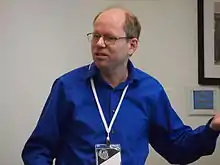John Mark Ockerbloom | |
|---|---|
 Ockerbloom in 2014 | |
| Born | John Ockerbloom 1966 (age 57–58) |
| Education | PhD |
| Occupation | Software engineer |
| Employer | University of Pennsylvania |
| Known for | Online Books Page |
| Notable work | (see bibliography) |
| Title | Digital library architect |
| Notes | |
John Mark Ockerbloom (born 1966) is a digital library architect and planner in the library science field. Formerly at Carnegie Mellon University,[2] from which he earned a PhD in computer science, he now works for the University of Pennsylvania. He is the editor of The Online Books Page, which lists over two million books including project Gutenberg titles, all of which are freely available for reading online or by download.
Education
Mark Ockerbloom attended Carnegie Mellon University in the 1990s and earned a PhD in computer science.[1]
Career
Mark Ockerbloom works as a digital library planner[3] and researcher[4] at the University of Pennsylvania.
He is involved in the use of technology by the general public for the public good. He is the chair of the ILS-DI Task Group for the Digital Library Federation.[5]
Free speech
In 1994, Mark Ockerbloom created Banned Books On-Line in response to the censoring of usenet newsgroups on Carnegie Mellon's servers.[1] A number of organizations including Electronic Frontier Foundation and the American Civil Liberties Union were opposing the Communications Decency Act around that time and took note of Banned Books On-Line, linking to it from their websites.[1]
In 1998, Mark Ockerbloom joined as a plaintiff along with columnist Rob Morse of the San Francisco Examiner, the ACLU and others in a federal lawsuit against a library using web filtering software.[1][6] The Loudoun County Library in Virginia installed X-Stop filtering software created by Log-On Data Corporation.[6] The filtering software stopped library patrons from visiting the websites of the San Francisco Examiner, The San Francisco Chronicle and Ockerbloom's Banned Books On-Line.[6]
Copyright
Mark Ockerbloom has pointed out some of the conflicts between web 2.0 and copyright law, describing how multimedia can contain unintended copyright violations.[7] Mark Ockerbloom runs the Online Books Page, which indexes books that are free to read over the Internet.[8] In 1993, while at Carnegie Mellon University, Ockerbloom started the Online Books Page which allows readers to find books by title, subject or author.[9] The site has been described as one of the largest[10] and most popular[3] resources for online books. He has said the Copyright Term Extension Act can have a chilling effect on websites that provide readers easy access to books online and is concerned about the conflict between the public good and the interests of for-profit enterprises.[11]
Personal life
Mark Ockerbloom's wife, Mary Mark Ockerbloom, is the editor of A Celebration of Women Writers website, which lists resources about women writers and works written by women that are freely viewable online.[12][13]
Bibliography
- Mark Ockerbloom, John (2008). Mapping the Library Future: Subject Navigation for Today's and Tomorrow's Library Catalogs. Scholarly Commons. OCLC 727908567.
- Mark Ockerbloom, John (2006). The Next Mother Lode for Large-scale Digitization? Historic Serials, Copyrights, and Shared Knowledge. Scholarly Commons. OCLC 727908567.
- Mark Ockerbloom, John (1998). Mediating Among Diverse Data Formats. Pittsburgh: Carnegie Mellon University. OCLC 39527519.
- Mark Ockerbloom, John (August 1995). Exploiting Structured Data in Wide-Area Information Systems. Pittsburgh: Carnegie Mellon University. OCLC 33879705.
References
| Library resources about John Mark Ockerbloom |
| By John Mark Ockerbloom |
|---|
- 1 2 3 4 5 Pollak, Michael (18 June 1998). "A Web Site To Fight Censorship". The New York Times. ISSN 0362-4331. OCLC 1645522.
- ↑ Troll Covey, Denise (October 2005). Acquiring Copyright Permission to Digitize and Provide Open Access to Books (illustrated ed.). Washington, DC: Digital Library Federation, Council on Library and Information Resources. ISBN 9781932326222. OCLC 61448107.
- 1 2 Minkel, Walter (1 June 2004). "Chat Room: Yours for the Taking". School Library Journal. Plain City, Ohio: Media Source Inc. ISSN 0362-8930. OCLC 488620538.
- ↑
Cypher, Kimberly Anne (2008). The Impact of the Least Restrictive Environment for American Indian High School Students on an IEP. Ann Arbor, Michigan. p. 33. ISBN 9780549564850.
{{cite book}}: CS1 maint: location missing publisher (link) - ↑ Hadro, Josh (15 June 2008). "Berkeley Accord, ILS API Discussed". Library Journal. Plain City, Ohio: Media Source Inc. ISSN 0363-0277. OCLC 36096783. Archived from the original on 11 April 2013.
- 1 2 3 NYT staff (9 February 1998). "More Join Challenge to Library Over Blocking of Internet Sites". The New York Times. ISSN 0362-4331. OCLC 1645522.
- ↑ Brantley, Peter (19 October 2007). "Take the A Train". O'Reilly Radar. O'Reilly Media.
- ↑ Brogan, Martha L.; Rentfrow, Daphnée (2005). A Kaleidoscope of Digital American Literature. Washington, DC: Council on Library and Information Resources, Digital Library Federation. ISBN 9781932326178. OCLC 61247191.
- ↑ Peyton, Dave (6 December 1999). "A Likely Story: Finding And Reading Books On Net". Chicago Tribune. ISSN 1085-6706. OCLC 60639020.
- ↑ Peyton, Dave (7 January 2002). "Virtual bookshelves brim with free text". Chicago Tribune. ISSN 1085-6706. OCLC 60639020.
- ↑ Slaton, Joyce (13 January 1999). "A Mickey Mouse Copyright Law?". Wired. New York City. ISSN 1059-1028. OCLC 24479723.
- ↑ Still, Julie (2001). Creating web-accessible databases: case studies for libraries, museums, and other nonprofits. Medford, New Jersey: Information Today, Inc. ISBN 9781573871044.
- ↑ Mark Ockerbloom, Mary. "A Celebration of Women Writers". Retrieved 5 June 2014.
External links
- Selected works of John Mark Ockerbloom
- "The Online Books Page; Official Website". University of Pennsylvania. Retrieved 20 June 2013.